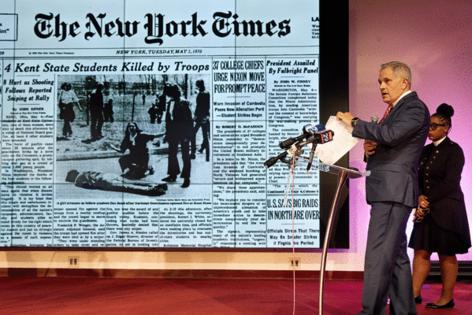ks-TRUMP-POLICE-PHILLY // Philadelphia DA Krasner, religious leaders call Trump's DC police takeover racist, say there's no legal avenue to do the same in Philly
Published in News & Features
Philadelphia District Attorney Larry Krasner and city religious leaders on Tuesday decried President Donald Trump’s plan to effectively take over local law enforcement in Washington, D.C., as rooted in racism and fearmongering. And although Trump has not expressed interest in taking a similar approach to combating crime in Philadelphia, any attempt to do so would likely face significant logistical and legal challenges.
Krasner, alongside Jewish, Christian, and Muslim faith leaders, said there is no legal basis for Trump to carry out such a plan in other cities and warned that he should steer clear of Philadelphia.
“You’re not going to D.C. and L.A. and New York, and you’re not coming here, because we are going to uphold the Constitution and the laws of the United States,” he said.
The Rev. Carolyn Cavaness, pastor of the historic Mother Bethel A.M.E. Church, said the Trump administration “has no heart.”
“We will trample over oppressors who try to take over our rights,” she said.
Krasner called on residents to organize protests against the actions he called illegal and unconstitutional. And he and Cavaness said Trump was targeting cities with majority Black and brown residents, and conjuring up fear that crime was out of control when, in fact, it has declined dramatically since the pandemic.
The outcry followed Trump’s announcement Monday that he would place the D.C. police force under federal control and deploy hundreds of National Guard troops to protect the district’s streets and residents from “bloodthirsty criminals” and “roving mobs of wild youths.”
Trump spoke of D.C.’s deployment as a test — one that he suggested would have “tremendous success” and that should be a model for cities led by Democratic officials. The Republican president said his administration would consider taking similar action in New York, Chicago, and Los Angeles “if they don’t learn their lesson.”
“If we need to, we’re going to do the same thing in Chicago,” he said.
But Trump would face significant obstacles if he attempted to replicate the federal law enforcement strategy in other cities like Philadelphia — and there is no legal avenue for him to do so in the same manner as D.C.
Perhaps most important are structural differences between other jurisdictions and the capital.
Because D.C. is a federal district, Trump has wide authority to control its affairs, including its police force for 30 days — something the city’s mayor, Muriel Bowser, acknowledged Monday. Washington’s National Guard is the only unit, of all American states and territories, that reports directly to the president.
In Pennsylvania, Gov. Josh Shapiro is the commander in chief of the state’s National Guard, meaning he would have to authorize the deployment of any troops. But that authority is being challenged in court after Trump sent troops to Los Angeles in June without Gov. Gavin Newsom’s approval. A federal appeals court said last month that Trump acted within his authority, and a trial on the matter began this week.
Peter Andrews, a former federal prosecutor and now head of Krasner’s federal litigation unit, said there would need to be an insurrection or significant conflict on the streets for Trump to bypass Shapiro’s powers. Krasner, to that point, noted the vast reduction in crime and gun violence in Philadelphia in the last two years — a trend that mirrors other cities, including D.C.
“It’s not just hypocritical, it reveals that the president does not understand the rule of law,” Andrews said.
There is no precedent — or law — that would allow the federal takeover of a municipal police force in another city. Philadelphia’s criminal justice system is largely led by local officials: the police commissioner is appointed by the locally elected mayor, and the district attorney is elected by local residents, as are the judges in the city’s criminal courthouse.
Federal agencies including the FBI and DEA have local field offices in Philadelphia, but agents typically complement and collaborate with local law enforcement — providing additional resources or specialized expertise in areas such as cybercrime or forensic examinations.
Trump could seek to direct federal prosecutors to take a larger role in adopting and prosecuting local criminal cases. The U.S. Attorney’s Office for the Eastern District of Pennsylvania has broad investigative and prosecutorial powers in Philadelphia and eight surrounding counties, and the office — like dozens of others across the country — typically aligns its priorities with the goals of Justice Department leaders in Washington.
During Trump’s first term, then-U.S. Attorney William McSwain served as a pugnacious example, positioning himself as an old-school, tough-on-crime prosecutor. At times, his office even took the unusual step of adopting cases that had already been charged by Krasner, whom McSwain repeatedly accused of being too lenient.
But current U.S. Attorney David Metcalf has so far retained a low profile and avoided taking similarly controversial stances. His office declined to comment Tuesday when asked if the Trump administration had requested any shift in its prosecutorial priorities.
Any desire from the White House to adopt more violent crime cases would also likely run into logistical challenges. Federal prosecutors in Philadelphia have traditionally brought fewer cases than their local counterparts, and the U.S. Attorney’s Office has fewer attorneys than the DA’s Office.
Trump’s administration has also been outspoken in seeking to increase the role of federal law enforcement in pursuing another priority: targeting immigration offenses in support of his pledge for mass deportations — creating another competing area of focus for the federal agencies at his disposal.
_____
©2025 The Philadelphia Inquirer. Visit inquirer.com. Distributed by Tribune Content Agency, LLC.










Comments